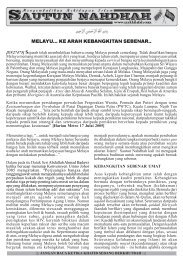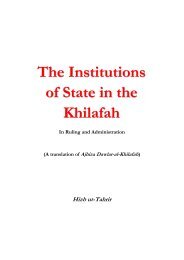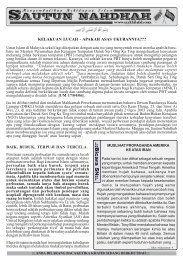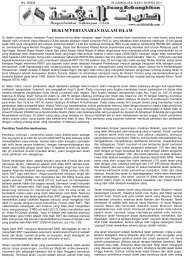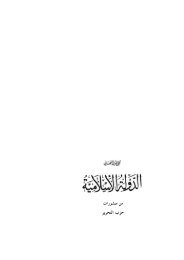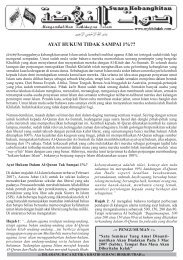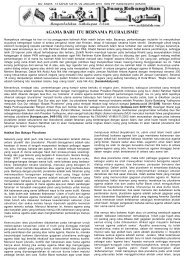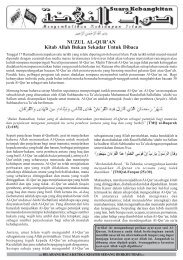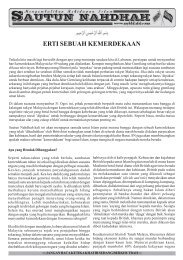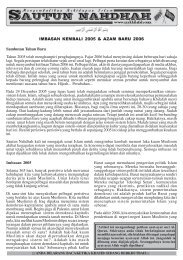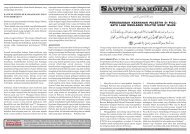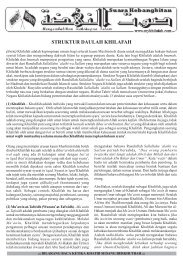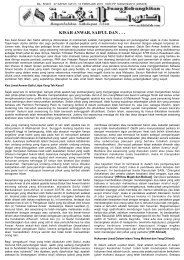A Warm Call from Hizb ut-Tahrir to the Muslims - MyKhilafah.com
A Warm Call from Hizb ut-Tahrir to the Muslims - MyKhilafah.com
A Warm Call from Hizb ut-Tahrir to the Muslims - MyKhilafah.com
You also want an ePaper? Increase the reach of your titles
YUMPU automatically turns print PDFs into web optimized ePapers that Google loves.
14 u A <strong>Warm</strong> <strong>Call</strong> <strong>from</strong> <strong>Hizb</strong> <strong>ut</strong>-<strong>Tahrir</strong> <strong>to</strong> <strong>the</strong> <strong>Muslims</strong><br />
Likewise, <strong>the</strong>re existed a similar situation before <strong>the</strong> advent of World<br />
War II between <strong>the</strong> Nazis and <strong>the</strong> so-called free world. Before that it<br />
was between Islam and Capitalism and so on and so forth. The reality of<br />
life is that <strong>the</strong>re are thoughts that are contrary <strong>to</strong> each o<strong>the</strong>r. These<br />
thoughts are embodied in states and material power is <strong>ut</strong>ilised <strong>to</strong> spread<br />
<strong>the</strong>m and defend <strong>the</strong>m using political, cultural, economic and military<br />
means. This is <strong>the</strong> reality of Jihad. It is <strong>to</strong> fight using material force for<br />
<strong>the</strong> sake of <strong>the</strong> thought after exhausting <strong>the</strong> political and cultural styles.<br />
However, <strong>the</strong> Islamic army or <strong>the</strong> spirit of Jihad is not like <strong>the</strong> German<br />
military that is a military power for <strong>the</strong> purpose of p<strong>ut</strong>ting <strong>the</strong> (German)<br />
people above <strong>the</strong> o<strong>the</strong>r peoples. Ra<strong>the</strong>r, it is <strong>the</strong> military force that<br />
removes <strong>the</strong> material obstacles in front of <strong>the</strong> Islamic <strong>Call</strong>, in order <strong>to</strong><br />
make <strong>the</strong> people embrace Islam and join with <strong>the</strong> rest of <strong>the</strong> <strong>Muslims</strong> <strong>to</strong><br />
form one Ummah, in which <strong>the</strong>re is no superiority for one Muslim over<br />
ano<strong>the</strong>r except in Taqwa (<strong>the</strong> fear of Allah).<br />
Al-qaDaa' wal-qadar, as a meaning of <strong>the</strong>se two words <strong>to</strong>ge<strong>the</strong>r, is <strong>the</strong><br />
actions that fall within <strong>the</strong> sphere that controls man, i.e. which take place<br />
against his will, <strong>to</strong>ge<strong>the</strong>r with <strong>the</strong> attrib<strong>ut</strong>es of objects. As for <strong>the</strong> specific<br />
meaning of <strong>the</strong> word qadar, it is <strong>the</strong> knowledge of Allah. Thus it has<br />
nothing <strong>to</strong> do with <strong>the</strong> voluntary actions of man for which he is<br />
accounted by Allah, just as he is accounted in <strong>the</strong> Dunya by <strong>the</strong> state,<br />
parents and guardians. Where is <strong>the</strong> fatalism in this understanding of<br />
al-qDdaa' wal-qadar Where was <strong>the</strong> fatalism when <strong>the</strong> <strong>Muslims</strong>, with this<br />
understanding, conquered <strong>the</strong> world and subdued o<strong>the</strong>r nations<br />
Moreover, adoption of this concept forces <strong>the</strong> person <strong>to</strong> investigate,<br />
study, and assess <strong>the</strong> o<strong>ut</strong><strong>com</strong>e and consequences of an action before<br />
undertaking it, so that he is clear on <strong>the</strong> aspects of blame and<br />
accountability. There is also <strong>the</strong> view of <strong>the</strong> action after it has occurred<br />
whe<strong>the</strong>r with or witho<strong>ut</strong> his choice, is that it has occurred and it is<br />
finished. Thus, one must accept that it has happened, b<strong>ut</strong> not necessarily<br />
accept what has happened, and thus act <strong>to</strong> change it. Thus <strong>the</strong> event<br />
that happened as a qadar (fate) according <strong>to</strong> <strong>the</strong> knowledge of Allah,<br />
man must accept that it has happened and is finished. He should not feel<br />
agitation or worry. Nei<strong>the</strong>r he should accept what has happened, thus<br />
leaving it witho<strong>ut</strong> remedy. Ra<strong>the</strong>r, he should not accept <strong>the</strong> situation<br />
that arose due <strong>to</strong> what happened, so as <strong>to</strong> treat it after it happened.<br />
Those two views <strong>to</strong>ge<strong>the</strong>r are indispensable such that life continues with<br />
vitality and force in a real and practical manner in accordance with high<br />
values.<br />
A <strong>Warm</strong> <strong>Call</strong> <strong>from</strong> <strong>Hizb</strong> <strong>ut</strong>-<strong>Tahrir</strong> <strong>to</strong> <strong>the</strong> <strong>Muslims</strong> u 15<br />
It is a fact is that he is accounted for <strong>the</strong> voluntary actions, whereas he<br />
is not blamed for <strong>the</strong> non-voluntary actions, because <strong>the</strong>y are not within<br />
his ability <strong>to</strong> repel <strong>the</strong>m. Beside that, every action that has happened<br />
would not have happened except in accordance with <strong>the</strong> knowledge (‘ilm)<br />
of Allah. This is <strong>the</strong> fact that every action that has happened would not<br />
have happened except according <strong>to</strong> <strong>the</strong> knowledge of Allah. All of that<br />
insures <strong>the</strong> presence of those two viewpoints. In o<strong>the</strong>r words, it makes<br />
a person proceed in his actions not based on imagination, <strong>the</strong>oretical<br />
hypo<strong>the</strong>ses, or whims, nor linked <strong>to</strong> continuous sorrow and sadness over<br />
what has already occurred; ra<strong>the</strong>r he moves forcefully in a real and<br />
practical manner, in accordance with <strong>the</strong> high values required by life.<br />
That is why <strong>the</strong> view of qadar on its own and qaDaa' and qadar <strong>to</strong>ge<strong>the</strong>r<br />
incites man and makes him active, and it protects him <strong>from</strong> hopelessness<br />
and sorrow, just as it protects him <strong>from</strong> laziness and lethargy. The focus<br />
is not regarding <strong>the</strong> voluntary actions before undertaking <strong>the</strong> actions;<br />
ra<strong>the</strong>r it is regarding <strong>the</strong> actions after <strong>the</strong>y have been carried o<strong>ut</strong> and<br />
<strong>the</strong> actions that <strong>to</strong>ok place o<strong>ut</strong>side <strong>the</strong> sphere of his control. This is<br />
because such events have occurred and <strong>the</strong> matter is finished. So he<br />
must not feel sorrow or pain that <strong>to</strong>rments <strong>the</strong> soul and deviates it <strong>from</strong><br />
its sublime goal in life and <strong>from</strong> entering <strong>the</strong> mainstream of life. How far<br />
is this <strong>from</strong> what <strong>the</strong> Capitalists have in terms of agonising pain and<br />
distressful sorrow felt by <strong>the</strong> losers, which make <strong>the</strong> word 'luck' play<br />
such a big role in <strong>the</strong>ir lives Consequently, belief in qadar and belief in<br />
qaDaa' and qadar is one of <strong>the</strong> greatest blessings for <strong>the</strong> mind and one<br />
of <strong>the</strong> greatest incentives <strong>to</strong> plunge in<strong>to</strong> <strong>the</strong> battlefield of life with<br />
courage and dignity. This is because in <strong>the</strong> sphere that man controls, he<br />
is responsible for all his voluntary actions. He is obliged <strong>to</strong> be aware of<br />
<strong>the</strong>m and bear responsibility. If a mistake or misguided act <strong>to</strong>ok place<br />
<strong>the</strong>n he must bear <strong>the</strong> consequences. However, he must also realise that<br />
what has happened, whe<strong>the</strong>r correct or incorrect, has happened with<br />
<strong>the</strong> Knowledge and Comprehension of Allah . It was inevitable that it<br />
would happen. Therefore he should not be preoccupied by it, ra<strong>the</strong>r he<br />
should move on, i.e. persevere in life. As for <strong>the</strong> sphere which controls<br />
him and in which <strong>the</strong> actions occur witho<strong>ut</strong> his choice, he is not<br />
responsible for <strong>the</strong>m and he will not bear <strong>the</strong>ir consequences.<br />
Fur<strong>the</strong>rmore, <strong>the</strong>y happened with <strong>the</strong> Knowledge and Comprehension<br />
of Allah , so it was inevitable that <strong>the</strong>y would happen. Therefore man<br />
1<br />
2<br />
3<br />
4<br />
5<br />
6<br />
7<br />
8<br />
9<br />
10<br />
11<br />
12<br />
13<br />
14<br />
15<br />
16<br />
17<br />
18<br />
19<br />
20<br />
21<br />
22<br />
23<br />
24<br />
25<br />
26<br />
27<br />
28<br />
29<br />
30<br />
31<br />
32<br />
33<br />
34<br />
35<br />
36<br />
37<br />
38<br />
39



